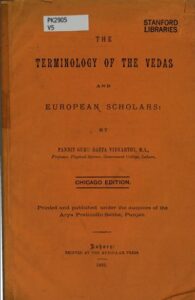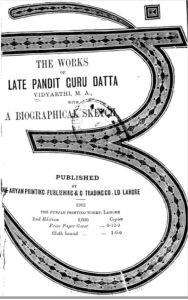A Critic of Early European Scholarship
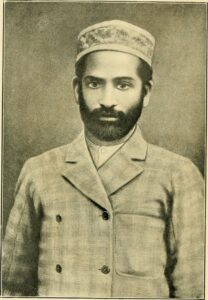 Gurudatta Vidyarthi, 1864-1890
Gurudatta Vidyarthi, 1864-1890
Vedic Scholar
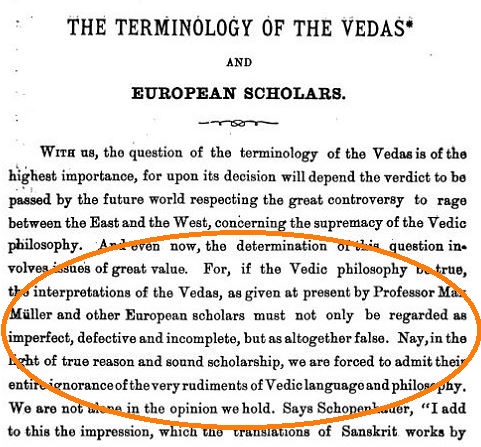
“Professor Max Muller and other European Scholars must not only be regarded as imperfect, defective and incomplete but all together false. Nay, in the light of true reason and sound scholarship, we are forced to admit their entire ignorance of the very rudiments of Vedic language and philosophy.”
***
Who was Pandit Guru Data Vidyarthi?
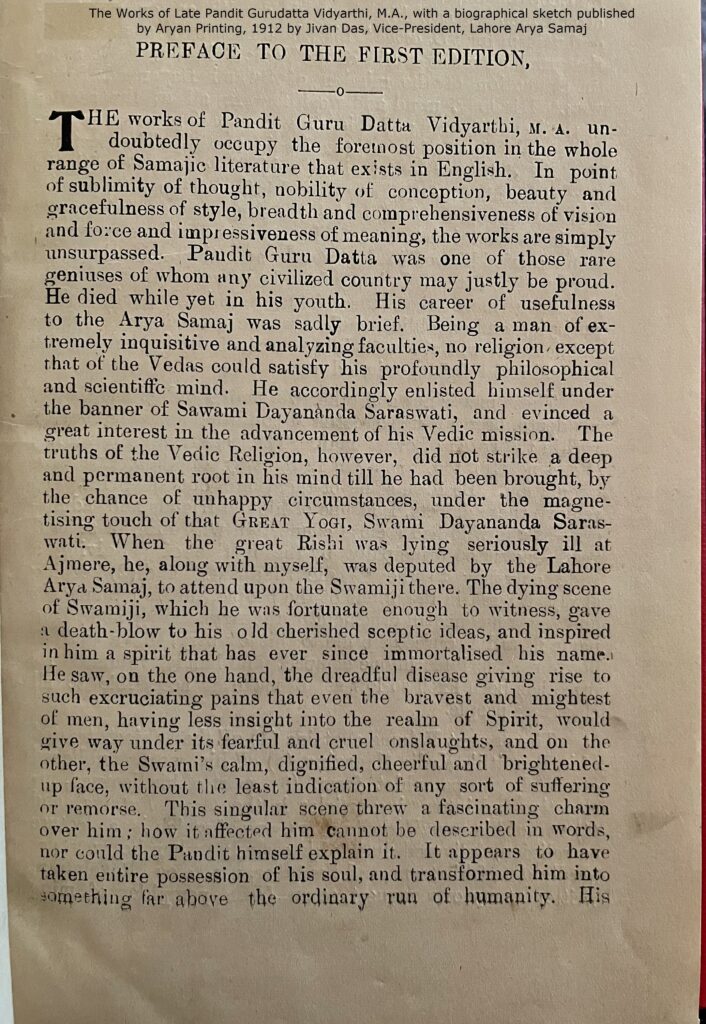
The Whole of Guru Data’s Works
***
College Thesis
The Terminology of The Vedas and European Scholars
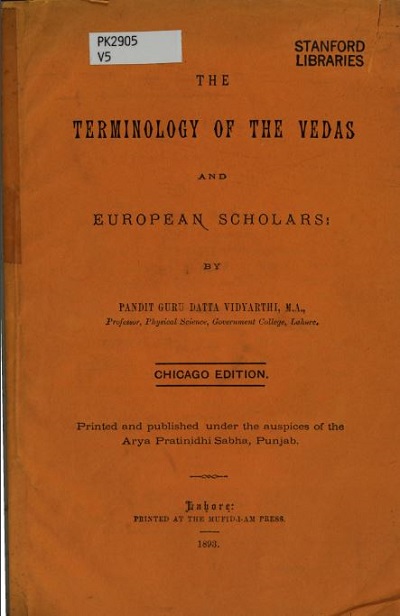








The Terminology of The Vedas and European Scholars – Book PDF
A Biographical Sketch of Pandita Gurudatta
by VEDIC PRESS
A Biographical Sketch
Pandit Gurudatta is recognized to have been the greatest achievement of Rishi Dayananda for his ancient Aryan church. The dying glance of the Rishi had miraculously transformed the mettle which was there in the young intrepid scholar. Had not death out short (died age 26) his scholastic career so early, the Arya Smaj and thought it the whole world of religious and metaphysical thought may have been contribute enriched by his erudite philosophic contributions, of which the few dissertations and brief discourses he could, in the midst of his manifold activities, find time to write, gave sure promise.
An unmistakable vein of sincere love of truth for which no sacrifice of personal glory and earthly possession and comfort was too great runs through them all. This marks Gurudatta out as a genuine philosopher whose craving for spiritual light was not simply intellectual; it was the innermost call of his disconsolate soul. He it was who recognized in the last glance of Rishi Dayananda the soul of a seer, anxious to save a money-mad world from the dismal abyss of gross materialism to guide it away by the help of the eternal light of the Veda to the empyrean heights of Spiritual Bliss.
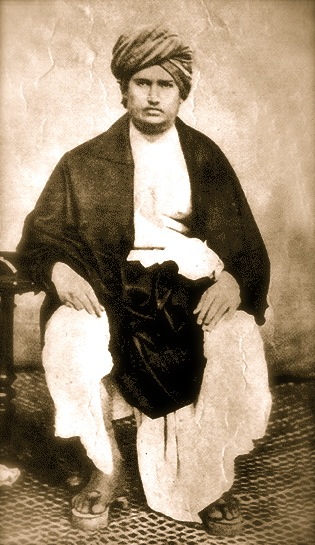
In that departing glance he read a message, a command to take up the challenge which the asuri demonical, forces of mammon were throwing out to the ancient daiva, divine, culture of the Rishis. The young boy of nineteen took the challenge up, and coming of a warlike race fought to the last on the side of truth and righteousness. His was the death of a hero who, like another young boy whom Muse glorifies as having died on the station of his duty in another sphere.
Spiritual Discipline in the Vedas
In 1885 he graduated and in 1886 he passed his M.A. His subject was physical Science. The position secured by him in the pass list remains yet a record in the University which no succeeding candidate has yet surpassed. In the meantime, Gurudatta had been touring the Punjab attending anniversaries of Arya Samaja. He had been busy reading the scriptures and books on philosophy and religion both eastern and western. For two years he was acting Professor at the Government College where his deep erudition and pedagogic capability met with high and well-merited appreciation. The movement to found a college in memory of Rishi Dayananda had, since the death of the Sage, been launched by the guiding spirits of the Arya Samaja. Gurudatta threw himself heart and soul into the campaign to collect funds for that, to him, of the cause were recognized as wonderful specimens of erudition and oratory. The D.A.V college of Pandita Gurudatta’s dream was an institution where Brahmacharya would be the dominant factor in the life of the students and ancient shastras the primary study in the curriculum of the academy. He was yet living when under the influence of the University the D.A.V college was given its present shape and character. He expressed strong dissatisfaction with its new aims; and puts emphatically on record his disagreement with its then conductors as regards his disagreement with its then conductors as regards their educational policy. In the short period of six years after he had seen the Rishi he had acquired marvelous mastery of sacred books of samskrita. A treatise by him entitled “The Terminology of the Vedas” was included in the course of Samskrita for the degree examination at Oxford. His translation of a few of the Upanishads, when after his death copies of it were sent to America on the occasion of the Parliament of Religious held at Chicago in 1893, won such appreciation that an publisher, of his own accord. Gurudatta spoke, for hours in Samskrita, which feat won him the title ‘Pandita’ which sticks still to this name. He in his humility styled him Pandita. This was true Brahmna spirit which marked Gurudatta throughout his carrier. To his Ashtadhyayi class came some old men, among them an E.A.C. who had taken leave for the sole object of reading Grammar with Gurudatta. A Youngman of only twenty-six attracting pupil of all ages, and making such stir among the populace recalled scenes from the hoary history of Bharata Varhsa of the time of Janaka and Yajanvalkya.
A Biographical Sketch of Pandita. Gurudatta BY VEDIC PRESS

PREFACE TO THE FIRST EDITION
THE works of Pandit Guru Datta Vidyarthi, M. A. undoubtedly occupy the foremost position in the whole range of Samajic literature that exists in English. In point of sublimity of thought, nobility of conception, beauty and gracefulness of style, breadth and comprehensiveness of vision and force and impressiveness of meaning, the works are simply unsurpassed. Pandit Guru Datta was one of those rare geniuses of whom any civilized country may justly be proud. He died while yet in his youth. His career of usefulness to the Arya Samaj was sadly brief. Being a man of extremely inquisitive and analyzing faculties, no religion except that of the Vedas could satisfy his profoundly philosophical and scientific mind. He accordingly enlisted himself under the banner of Swami Dayananda Saraswati, and evinced a great interest in the advancement of his Vedic mission. The truths of the Vedic Religion, however, did not strike a deep and permanent root in his mind till he had been brought, by the chance of unhappy circumstances, under the magnetising touch of that GREAT Yogi, Swami Dayananda Saraswati. When the great Rishi was lying seriously ill at Ajmere, he, along with myself, was deputed by the Lahore Arya Samaj to attend upon the Swamiji there. The dying scene of Swamiji, which he was fortunate enough to witness, gave a death-blow to his old cherished skeptic ideas, and inspired in him a spirit that has ever since immortalized his name. He saw, on the one hand, the dreadful disease giving rise to such excruciating pains that even the bravest and mightiest of men, having less insight into the realm of Spirit, would give way under its fearful and cruel onslaughts, and on the other, the Swami’s calm, dignified, cheerful and brightened up face, without the least indication of any sort of suffering or remorse. This singular scene threw a fascinating charm over him; how it affected him cannot be described in words, nor could the Pandit himself explain it. It appears to have taken entire possession of his soul, and transformed him into something far above the ordinary run of humanity, His real conversion, thus, dates from the day of Swarniji’s death, after which we saw him ever fired with an extraordinary enthusiasm for “Dharma,” his whole nature permeated with the grand elevating truths of the Vedic Religion, restless for the promotion of the mission of Swami Dayananda Saraswati. His body, mind, and wealth were all at the service. of the Arya Dharma and his only occupation was the discovery and elucidation the Vedic truths. The lectures that he delivered on various subjects connected with the Arya Dharma produced a profound influence upon the people, and the appearance of his Vedic Magazine caused a great stir in the religious world. ‘That cursed disease – consumption – carried him off in his youth (died at the age of 26) and thus cut short his very useful career. It is much to be regretted that we could not have more than three issues of his Magazine. The purifying and ennobling truths that are stored up in these publications will ever remain a source of admiration to the learned and religious-minded men.
These magazines and other works of Panditji have, since his death, been in much a scattered condition as to be hardly within the reach of every man. Their aggregate high price. (Rs. 4 nearly), too, was a bar in the way of their extensive circulation. Besides, some of them are out of print. To remove these defects, I, as one of his old friends and admirers as one who had a close connection with him for several years actuated principally by the motive of (1) giving a wide currency to the ” Vedic Siddhants,” and (2) keeping always a fresh in the minds of the people, the fair name of one who was once an ornament of the Arya Samaj, and whoso name is still a source of pride to this country, have got all his works reprinted in one compact and handy volume. Its price has been fixed so low as to make it accessible to all classes of people.
The present Volume contains (1) all the subjects treated of in Panditji’s Vedic Magazine, (2) oil his works published separately in pamphlet form, (3) most of his learned, instructive and interesting articles in the Arya Patrika, and (4) two of his unpublished papers, one of which is a lecture on Religion delivered during his early life when he was yet hardly out of his teens, and the other, a note- on Revelation, written at my own request, on an Urdu pamphlet of mine.
Ill
Entitled the Maslah-i-Ilhdm (the Doctrine of Revelation). The change in the religious life of Pandit Guru Datta becomes all the more prominent and striking when one reads the above-mentioned lecture along with his other writings. It is, indeed very strange that the subject of Religion, which is so much decried in that lecture, soon after became a favourite topic of his written as well as, oral discourses.
It is worth notice that some of the fragments of his Criticism on Professor Monier Williams ” Indian Wisdom,” as embodied in this volume, are entirely new, and others different from what was already in print on the subject. These additions and changes have been made with the help of the original manuscript in the author s own handwriting which were so fondly and carefully preserved by me. Some mistakes of omission and commission have also been rectified with the help of the same manuscripts. Besides, I have made certain alterations which the sense of the text rendered imperative.
The present Volume is the first of its series. It is presented to the public with a view to encourage the appreciation of the Aryan Shastras among those of my country men who cannot have recourse to them in their original Sanscrit language.
LAHORE: JIVAN DAS, Pensioner,
October 1897. Vice-President, Lahore AryaSamaj
The Book
The Works of Pandit Guru Data Vidyarthi, M.A.
MORE
Swami Dayananda and Gurudatta Vidyarthi
VEDIC PRESS · PUBLISHED FEBRUARY 9, 2015 · UPDATED NOVEMBER 28, 2017
Swami Dayananda and Gurudatta Vidyarthi It was in the beginning of 1883 that Gurudatta Vidyarthi passed the Intermediate Examination in Arts of the Punajab University and headed the list of successful students. This success was a miracle because he was never known to be regular in his college studies. In almost all the ordinary examinations of the class, he only obtained barely passable marks and the cramming section of the class obtained high positions. But when the hour of trial came, his tenacious memory and his transparent intellect bore him up. To speak of the Dayanand Anglo-Vedic College, Pandit G.D. Vidyarthi’s connection with the movement dates from its very conception. In October 1883, when the news of Swami Dayananda Sarasvati’s fatal illness spread over the country like wildfire, the Executive Committee of the Lahore Arya Samaj deputed him and Lala Jiwan Dasji during his illness. At this time G.D. Vidyarthi was reading in the third year class of the Government College Lahore, and was hardly 20 years of age. The mere fact of his being deputed for so important and delicate a task, irrespective of how he performed it, shows the deep confidence which the wise President of the Lahore Arya Samaj had in him! It gives only some idea of the strong-hold he had begun to have on the counsels of the very careful and prudent members of that body. Yes, it was the spectacle of this dying Greatness with the firm belief in the first and final cause of the world, with Gayatri Mantra on its lips that went to the core of the already deeply affected tender part of young G. D. Vidyarthi. It was here that perceived the groundness and sublimity of devotion; it was here that be had a glance of the peace of mind (shanti) with which a devotee- an humble servant of the OMNIPOTENT and His universe leaves this existance of flesh and bone to rise and fly to higher regions, where dwell only those spirits that have, unmoved by disasters and storms, unaffected by pains and penalties, fought the battle of truth and duty with glory to themselves and their Maker. Never since then has G. D. Vidyarthi been known to have wavered in his belief in God, and His Vedas, never since then has been heard to utter a word of criticism.
For your kind information Gurudutta Vidyarthi lived only for 26 years. He lived only for six years after the death of Swami Dayananda Sarasvati. In June 1888 his book ‘The Terminology of the Vedas’ was published. The book ‘The Terminology of Vedas’ had been prescribed in the course in Oxford University. He started a newspaper ‘Regenerator of Arya Vart’ and a magazine ‘Vedic Magzine.’
